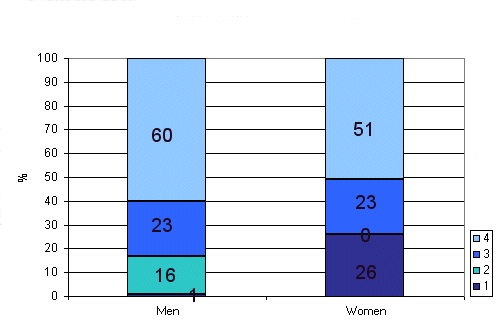ISSP 2002: Family and Changing Gender Roles III: Finnish Data
European Values Study 1999/2000
Perceptions of family, children and household work strategies
Helena Laaksonen
10.11.2003
Finland takes part in several international research programmes which collect data useful for family research. FSD has recently released the ISSP 2002 Finnish Data and the European Values study 1999/2000 (EVS). The international data of ISSP 2002 will be available for secondary use next year. The EVS 1999/2000 Finnish Data is already available.
Both surveys studied opinions on working mothers, the importance of having children and the impact of a working mother on child well-being and happiness. The surveys contain some similar or nearly similar questions. ISSP 2002 concentrated more on household work strategies and how to combine work and family life. EVS 1999/2000 focused more on people's values.
What should children learn at home?
EVS 1999/2000 data contain a number of questions about raising children. Respondents were asked how important it was that children learned independence, hard work, sense of responsibility or unselfishness at home. In addition, the survey studied how important certain aspects are for a successful marriage and the general importance of marriage and family. There are notable differences regarding these issues in different countries: e.g. in Denmark over 30% of the respondents do not consider having children important for a successful marriage whereas in Hungary only 2% agreed with this view.
Who does the laundry...
ISSP 2002: Family and Changing Gender Roles III contains several questions about the division of the household work within the family. Couples were asked who takes care of the laundry, small repairs, sick family members or cooking the meals.
Household work strategies were studied further by asking how much time the respondent and his/her partner spends on household work per week. Respondents were also asked whether they found the division of work fair.
It is not wholly straightforward to compare the perceptions of men and women of the time they and their partners spend on household work. Various background variables and their combinations bring forth differences in responses e.g. by age or by place of residence. The number of family members and occupational status may also have an effect on the division of work.
One question studied who decides how to raise the children. Responses could be compared with the data from Family Barometers, also archived at the FSD. Family barometers contain a number of questions pertaining to the upbringing of children.
Chart 1. Who makes decisions how to raise kids?

The values in the chart: 1=mostly me; 2=mostly my spouse/partner; 3=sometimes me, sometimes spouse/partner; 4=we decide together.
The chart has been formed by cross-tabulating the variable k28 (Who makes decisions how to raise kids) with respondents' sex. The respondents who chose the response options 5 'someone else' or 6 'does not apply' have been excluded.
Comparison potential
Since Finland has participated in the ISSP programme only from 2000 onwards, it is not possible to compare the results of ISSP 2002 with the earlier surveys on the same theme. These were conducted in 1998 and 1994. However, Finland has participated in the World Values Survey and European Values Study programmes from the beginning. The surveys have been conducted in four waves, the first in the beginning of the 1980s. Potential for comparative research can be assessed by taking a look at World Values Surveys study descriptions on FSD web pages.
Top of page | Privacy Policy
|